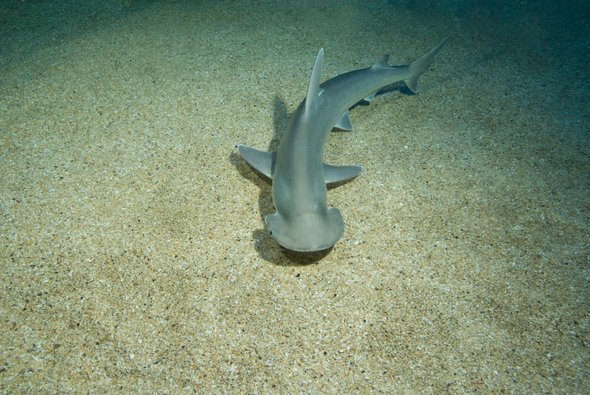(单词翻译:单击)
听力文本
This is Scientific American — 60-Second Science. I'm Christopher Intagliata.
Sharks aren't typically thought of as vegetarians. Or even omnivores. But about 10 years ago, scientists documented a dainty relative of the hammerhead shark, known as a bonnethead shark, consuming copious amounts of sea grass.
"A lot of people kind of just thought that oh the sharks were consuming it incidentally, while they're going after crabs and squid and other little invertebrates that live in the sea grass meadows." Samantha Leigh, a PhD candidate at the University of California, Irvine. "So everyone thought they were kind of just passing it through their system and not really getting anything from it."
So Leigh and her colleagues hauled five of the small sharks back to a Florida lab, and put them on a three-week diet: 90 percent sea grass, 10 percent squid. And analyzed the digestibility of that diet. Turns out, the sharks actually put on pounds, and were able to digest the sea grass just as well as young green sea turtles do.

"Even though the bonnethead shark has what scientists would deem a carnivorous gut, they are definitely acting like omnivores. So there's definitely something going on, on probably a microbial level, that's helping them break down this sea grass."
The full nutrition info is in the Proceedings of the Royal Society B.
The study also gives coastal ecosystem managers something new to chew on: these sharks are like lawn mowers, trimming the sea grass, digesting it, and, yes, recycling it. "So they likely play more of a stabilizing role in food web dynamics. They're not a top apex predator. And they're also probably playing a large role in nutrient transport in those sea grass meadow ecosystems as well."
As for whether we might convince more sharks to have a side salad with dinner? "I don't know that we'll be able to do that anytime soon."
Thanks for listening for Scientific American — 60-Second Science. I'm Christopher Intagliata.
参考译文
这里是科学美国人——60秒科学。我是克里斯托弗·因塔利亚塔。
通常,人们不会认为鲨鱼是素食动物。甚至也不会把它们看作杂食动物。但是大约10年前,科学家记录了双髻鲨(又称锤头鲨)的一种体型小巧的近亲吃掉大量海草的情况。
“很多人只是认为,这些鲨鱼是在追逐生活在海草场中的螃蟹、乌贼和其它小型无脊椎动物时,偶然地吃了海草。”加州大学欧文分校的在读博士生萨曼莎·利说到。“因此,所有人都认为海草只是穿肠而过,鲨鱼不会从海草中获得任何能量。”
于是,利和同事将5只小鲨鱼拖到佛罗里达的实验室,让它们进行为期三周的特别饮食计划:90%的海草,10%的乌贼。之后分析鲨鱼的消化率。结果发现,鲨鱼的体重的确增加了,而且它们能像年轻海龟那样消化海草。
“尽管科学家认为锤头鲨拥有肉食性肠道,但是它们的行为确实像杂食动物。所以,一定有某些东西在发挥作用,可能是在微生物水平上,帮助鲨鱼分解这些海草。”
完整的营养信息刊登在《英国皇家学会学报:B辑》上。
这项研究也为海洋生态管理者提供了一些值得深思的新想法:这些鲨鱼像割草机一样,修剪、消化,没错,还有循环利用海草。“所以,它们可能在食物网动态中发挥着更为稳定的作用。它们并不是顶端掠食者。但是在这些海草场生态系统的营养运输中,它们可能也发挥着重要作用。”
至于我们是否可以让更多的鲨鱼在用餐时加一份素沙拉?“我不知道我们能否尽快做到。”
谢谢大家收听科学美国人——60秒科学。我是克里斯托弗·因塔利亚塔。
译文为可可英语翻译,未经授权请勿转载!
重点讲解
重点讲解:
1. go after 追逐;追求;追击;
He went after the burglars.
他追赶那些窃贼。
2. put on 增加(体重);
I can eat what I want but I never put on weight.
我能想吃什么就吃什么,但是体重从来不增加。
3. even though 即使;尽管;纵然;
All the men were being deported even though the real culprits in the fight have not been identified.
尽管真凶尚未查出,所有参与斗殴的男子均被驱逐出境。
4. break down (使)(物质)分解;
The oil is attacked by naturally occurring microbes which break it down.
原油受到了自然产生的分解油类物质的微生物的侵蚀。


